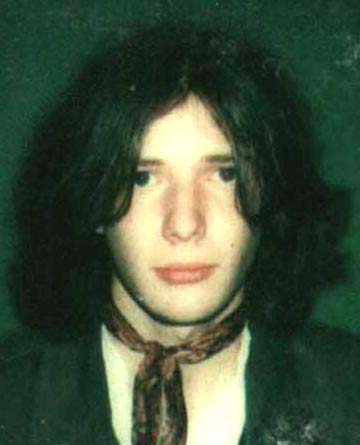
© Next Train 1985
You have reached the TEMPLE OF 'ALIAS JOHN RILEY'.
The John Riley phenomenon was born around 1982.
Then a young man in his teens, Riley was producing a huge repertoire of self-penned
songs and sound collages, influenced by the likes of Jimi Hendrix, The Beatles and
Pink Floyd - to name but a few. He managed to combine playing in regular pop/rock combos
such as 'Seven Sisters', with setting his sights on a possible post-band solo career.
His vision followed the lines of the sixties/seventies pop heroes and heroines that he so admired.
Indeed, the name John Riley came to him from a traditional folk song, brought to life by The Byrds,
on their glorious 'Fifth Dimension' album.
In the song, a sailor who has been at sea for 'ten long years' (like 'Martin Guerre'), returns to
his truelove - who has been waiting for him all this time. But he decides to test her love for him by
pretending that he himself is a new fancy. In this way, he is able to discover whether she has
taken another love in his absence,and whether her love for him remains strong.
Finally he admits to her that he is her 'long lost John Riley', and the story ends - happily, we hope.
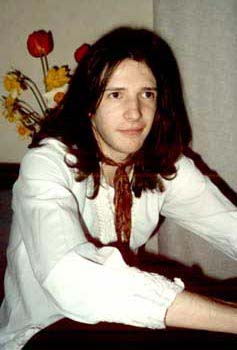
© Next Train 1986
Unfortunately Riley's band career collapsed in 1987, along with part of his soul.
To quote from one of his songs -
"I can't see through the storm that's passing overhead,
All I know is that I'm feeling almost dead,
So many paths forward, so many ways back
I don't know which one to choose I'll just follow this track."
Much intensive studio recording work however, meant that in 1988 (Alias) John Riley
was able to release two 'seminal' albums: 'Precarious Flamingo' and 'Hard Fruit'.
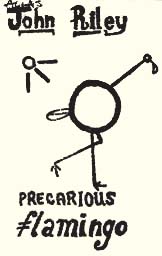 |
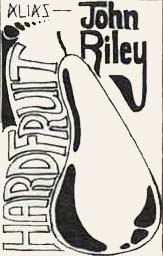 |
These collections included songs for a generation of Thatcher's children. 'In the Light of the Sun',
for example, alluded to the impending environmental crisis that was then being realised by many
people. Other compositions such as 'Computerised Doom' and 'Skinheads in Uniform' toyed with
images of the seedier sides of the Hi-Tech revolution and the National Security force in Britain.
John Riley had always been a rebel, and now was the time for him to speak out.
At the same time though, as with most artists and musicians, there was a lighter side to his work.
This sunnier, happy-go-luckiness was exemplified in songs like 'Belladonna Baby' and 'Supper in
the Morning'. Overall, this was Riley at his best. A peak in his initial artistic career.
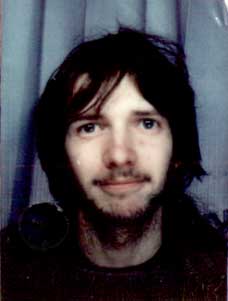
© Next Train 1988
Almost a year later, Riley was invited to record two of his 'Hard Fruit' songs
at an anonymous London studio. 'The Headhunter's Song' and 'Belladonna Baby'
were once again put to the test, this time with a drum-machine backbeat.
The session turned into a superb EP - eponymously titled 'Easter Egg' - which Riley
intended for release that year, but which never made it to the record shelves.
With the split of Seven Sisters weighing heavily in his mind and with alternative
career choices bearing down upon him, John swung away from his musical options, in
favour of a life away from it all, in the West Country - Devon.
"He barely touched his guitar", one friend was quoted as saying. "He wanted a new life,
with new friends - where people couldn't hurt him, and where he couldn't hurt them."
Art - painting, sculpture, printmaking etc. - became his sole purpose. He developed an
almost 'pious' approach to life, and followed strict routines, broken only when he felt
relaxed enough to be able to laugh at the world.
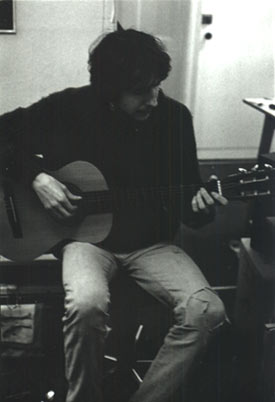
© Next Train 1988
Circumstances being as they were, after two years a move back to Surrey ensued. All the while,
our hero had been occasionally strumming with friends and playing them his recordings. They
liked his songs and tried to encourage him back to his musical path, but he wasn't ready
yet, he couldn't face the idea of anyone appreciating him for his musical ability.
Riley joined bands and left bands, mostly playing bass. He felt unfulfilled, and a little
mis-placed. This was, until he came across 'The Weedkillers', in mid-1993.
"I fell into it really", he says. "Not like a hole. More like an offer I couldn't refuse.
The bass player dropped out of a recording and they called me in at the last minute.
I was going out with the Tin-Whistler at the time, so it stood to reason that I should help out.
I played in a couple of other bands that year too, 'Temporal Unison' and 'Blackcat Bone' were good,
and 'Suntanner' was just knocked together from nothing really. With the Weedkillers, I started to
get the old feeling back - like nerve endings that had been blown away starting to grow again.
It was a steady and secure atmosphere to work in - we had fun. Of course, there were plenty of
down-points too, but the scales weighed in my favour. Suffice to say, that if it hadn't have
been for the Weedkillers, I probably wouldn't be where I am today. I'm lucky really!"
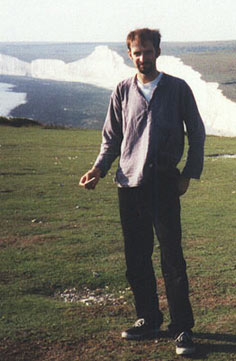
© Next Train 1995
In 1995, Riley, and most of the Weedkillers with him, set up home in Brighton - on the South
Coast of England. "It was a gamble really. Brighton's a pretty groovey place, where there
are plenty of like-minded people, all trying to get music and art projects off the ground.
I think the move has paid off. It's also the place where I did my first live solo performance,
in '97,at the then 'Cybar'."
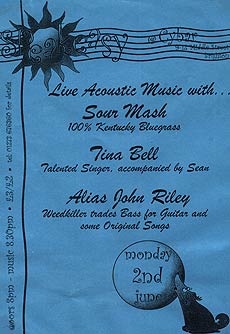
© Pesky.com 1997
"It wasn't the 'gig of all gigs'," he says. "But I was bloody nervous, I'd spent weeks
rehearsing. I flunked a few lines, but everybody seemed to like it anyway. I felt fantastic!
This was a completely new experience - singing my songs, on my own. It was like a
homecoming of some kind. I really appreciate the fact that so many people turned up, and I
doubt anyone wants to re-live it, but if you do - buy the recording, which will be out soon."
Several years and a few gigs later, Riley produced the enigmatic 'Photocopy of my Mind'
concept cassette album. It has been a long haul, but Riley is now set to take the bigger
stage at the forefront of British, and perhaps 'world' contemporary music.
So, he has made it thus far. A survivor in the face of adversity - a dancer with Death. From
place to place, from band to band, he sailed away to foreign lands. Just like his namesake
in that old song, John Riley has returned to us - STRONG.
To find out what he is up to now click HERE.
Click on this link to go to the RECORD SHOP:
 |
Or this one to go back to the MUSIC page:
 |
© Copyright exists on this website and on all products listed herein.
Infringement of this copyright could lead to prosecution under international law.